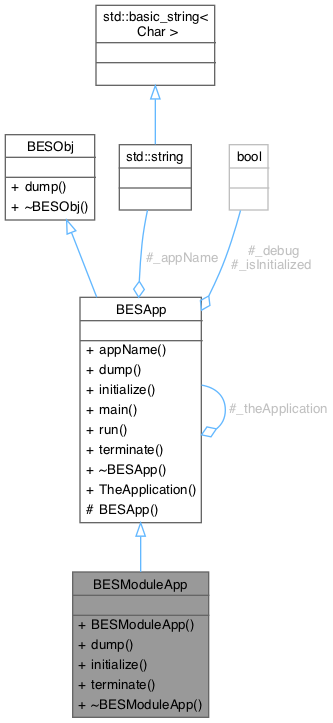Base application object for all BES applications. More...
#include <BESModuleApp.h>


Public Member Functions | |
| std::string | appName () const |
| Returns the name of the application. | |
| BESModuleApp () | |
| Default constructor. | |
| void | dump (std::ostream &strm) const override |
| dumps information about this object | |
| int | initialize (int argC, char **argV) override |
| Load and initialize any BES modules. | |
| virtual int | main (int argC, char **argV) |
| main routine, the main entry point for any BES applications. | |
| virtual int | run () |
| The body of the application, implementing the primary functionality of the BES application. | |
| int | terminate (int sig=0) override |
| clean up after the application | |
Static Public Member Functions | |
| static BESApp * | TheApplication () |
| Returns the BESApp application object for this application. | |
Protected Attributes | |
| std::string | _appName |
| bool | _debug {false} |
| bool | _isInitialized {false} |
Static Protected Attributes | |
| static BESApp * | _theApplication = nullptr |
Detailed Description
Base application object for all BES applications.
Implements the initialization method to initialize all global objects registered with the Global Initialization routines of BES.
Implements the terminate method to clean up any global objects registered with the Global Initialization routines of BES.
It is up to the derived classes to implement the run method.
- See also
- BESApp
Definition at line 55 of file BESModuleApp.h.
Constructor & Destructor Documentation
◆ BESModuleApp()
| BESModuleApp::BESModuleApp | ( | ) |
Default constructor.
Initialized the static _the Applicatioon to point to this application object
Definition at line 50 of file BESModuleApp.cc.
Member Function Documentation
◆ appName()
|
inlineinherited |
◆ dump()
|
overridevirtual |
dumps information about this object
Displays the pointer value of this instance along with the name of the application, whether the application is initialized or not and whether the application debugging is turned on.
- Parameters
-
strm C++ i/o stream to dump the information to
Implements BESApp.
Reimplemented in ServerApp, and StandAloneApp.
Definition at line 241 of file BESModuleApp.cc.
◆ initialize()
Load and initialize any BES modules.
- Returns
- 0 if successful and not 0 otherwise
- Parameters
-
argC argc value passed to the main function argV argv value passed to the main function
Reimplemented from BESApp.
Reimplemented in ServerApp, and StandAloneApp.
Definition at line 72 of file BESModuleApp.cc.
◆ main()
main routine, the main entry point for any BES applications.
main method of the BES application
It is up to the derived classes of BESApp to implement the main routine. However, the main method should call initialize, run and terminate in that order and should pass to the initialize routine the arguments argc and argv passed to the main function.
- Parameters
-
argC number of arguments passed to the application, which is argc passed to the main function. argV arguments passed to the application, which is argv passed to the main function.
sets the appName to argv[0], then calls initialize, run, and terminate in that order. Exceptions should be caught in the individual methods initialize, run and terminate and handled there.
- Returns
- 0 if successful and not 0 otherwise
- Parameters
-
argC argc value passed to the main function argV argv value passed to the main function
◆ run()
|
virtualinherited |
The body of the application, implementing the primary functionality of the BES application.
the applications functionality is implemented in the run method
It is up to the derived classes of BESApp to implement the run method.
It is up to the derived class to implement this method.
- Returns
- 0 if successful and not 0 otherwise
- Exceptions
-
BESError if the derived class does not implement this method
Reimplemented in CmdApp, ServerApp, and StandAloneApp.
◆ terminate()
clean up after the application
Calls terminate on each of the loaded modules
- Returns
- 0 if successful and not 0 otherwise
- Parameters
-
sig if the application is terminating due to a signal, otherwise 0 is passed.
Reimplemented from BESApp.
Reimplemented in ServerApp, and StandAloneApp.
Definition at line 200 of file BESModuleApp.cc.
◆ TheApplication()
|
inlinestaticinherited |
Member Data Documentation
◆ _appName
◆ _debug
◆ _isInitialized
◆ _theApplication
|
staticprotectedinherited |
The documentation for this class was generated from the following files: